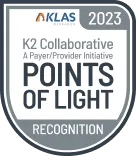The Cures Act will set a new precedent in the use, sharing and exchange of information in healthcare. The main goal of the Cures Act is to stop the practice of information blocking.
For more information about new guidelines set by Cures Act, take a look at this article on information blocking.
The introduction of the Cures Act will benefit patients and healthcare providers alike. As the healthcare industry transitions into compliance with the Cures Act, it is important to understand why mere compliance may not be enough.
Our team at Healthjump is committed to providing services for increased interoperability and compliance with information blocking regulations. To learn more about our services, read more here about Healthjump.
More Than Just Cures Act Compliance
.jpeg)
While there are healthcare providers and IT developers that are excited about what the Cures Act is attempting to accomplish, many see it as an obstacle. It’s important that healthcare professionals try to do more than just the bare minimum when it comes to following new regulations.
The Cures Act has the potential to transform healthcare into a patient-first, technologically driven industry. Many healthcare providers and IT developers don’t realize that the Cures Act is providing an incredible opportunity for the healthcare industry to be better and do better. It underscores the need for innovative applications and software, patient-focused strategies and easy-to-understand EHI capabilities for providers.
Take a look at some of the reasons why it’s important to do more than just comply with the Cures Act:
Decreasing Margin of Error
The National Library of Medicine published a report stating that deaths caused by medical errors are the third leading cause of death in the United States. It is estimated that 251,000 deaths a year are caused by medical errors. Many of these errors are caused by a lack of interoperability and information blocking.
The Cures Act information blocking regulations are being put in place to help reduce these kinds of medical errors. One of the biggest issues with current information blocking practices is that non-primary care physicians have difficulty accessing electronic patient information. This is especially dangerous in emergencies where physicians need medical history, allergies and other information right away. With the Cures Act, patients will have better control over their medical care and physicians can provide better care.
{{cta('4790edac-bfe7-4256-86b2-4e91b5306c17','justifycenter')}}
Increasing Product Value
Healthcare IT developers may view the Cures Act regulations as a nuisance to which they are forced to comply. But in reality, it’s the opportunity to actually increase the value of healthcare products.
One of the new regulations is that developers are required to input API integration and create smartphone applications for their programs. This is the perfect moment for developers to brainstorm all of the amazing ways in which their software and applications can be improved.
Consider what patients may want in an application outside of the ability to access EHI. Perhaps patients are looking for a place to track prescription medication intake or to write notes for their next appointment. These are the kinds of ways that the Cures Act regulations can actually encourage innovation and increase product value.
Better Data to Inform Decisions
Some healthcare facilities don’t have the right tools or processes to extract data due to instances of information blocking. Even if a healthcare facility uses an EHR, most don’t have the capabilities to pool, organize and siphon through data. With the Cures Act, interoperability should be at the forefront of technological initiatives.
When done right, interoperability can revolutionize the way that data is liquidized and used. Healthcare organizations will be able to draw the data that they need from a variety of sources including EHRs, public databases and registries.
Collecting this sort of data can help healthcare organizations implement better strategies, understand patient profiles and know what they need to invest in. Overall, through interoperability, healthcare providers can make better decisions.
Improving Quality of Care
The Cures Act will increase interoperability which should, in turn, increase quality of care for patients. The Office of the National Coordinator for Health Information Technology wrote a report in 2016 on health IT safety. One of the topics covered in this report was interoperability.
Incorrect patient matching was a major concern in the report in regards to a lack of interoperability. This means that when a patient’s electronic health information was requested, medical records for a different patient were sent instead. These are the kinds of mistakes that can cost patients their lives.
Information blocking regulations can substantially increase the quality of care that patients receive and eradicate issues like incorrect patient matching. Physicians will be able to access patient information faster and patients will have better control over their own medical care.
Inspiring Technological Innovation
One of the most important reasons as to why information blocking regulations and the Cures Act is about more than just compliance is technological innovation. The Cures Act should inspire IT developers to think outside of the box when it comes to accessing, using and sharing electronic health information.
This is an opportunity for health IT developers to consider all of the possibilities for what modern healthcare can look like on a technological level. Applications, software and programs can all be improved outside of what the Cures Act is requiring.
Data Management, Integration and Sharing Services
It’s easy to treat the implementation of the Cures Act as just another set of rules to follow. However, it’s crucial to keep in mind that it is about more than compliance. Healthcare providers and health IT developers need to reach past the bare minimum, because compliance is not enough.
Healthjump is one of the best ways to pursue a more interoperable form of data management. With the Healthjump Agent, you can be sure that aggregating, sharing, accessing, moving and organizing your data will be easier than it ever has been.
Healthjump offers premier app integration with over fifty EHR and medical software partnerships. When you use Healthjump, you can feel confident that you are doing more than just complying with information blocking regulations. You will be improving patient care, simplifying provider accessibility and increasing overall capabilities.





.svg)









